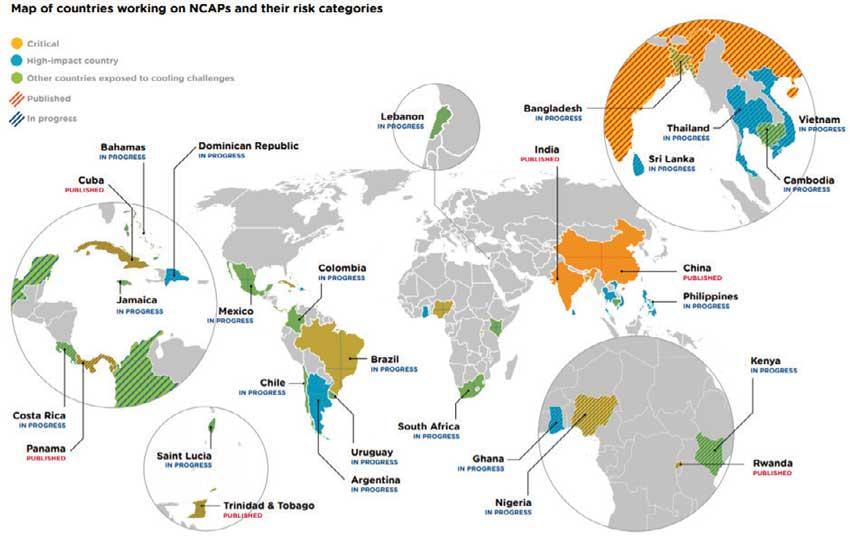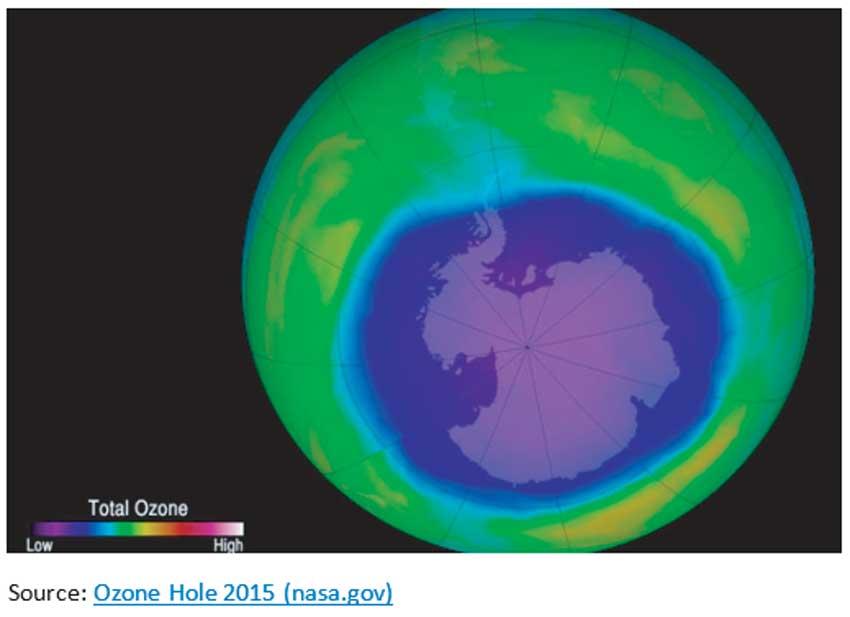05 Oct 2021 - {{hitsCtrl.values.hits}}

 The ozone layer is located in the lower stratosphereat a height of 15 to 30 kilometres above the earth, protecting it against the sun’sharmful ultraviolet (UV-B) radiation.
The ozone layer is located in the lower stratosphereat a height of 15 to 30 kilometres above the earth, protecting it against the sun’sharmful ultraviolet (UV-B) radiation.
It is like a blanket that protects the planet; a reduction in ozone concentration increases solar radiation damaging plants, animals, and human beings.
Human-induced depletion of the ozone layer due to excessive emissions of ozone-depleting substances (ODS) which are primarily used in the cooling sector is a major global environmental concern.
This article discusses the importance of a National Cooling Policy (NCP) for Sri Lanka as a part of IPS’ ongoing research, to phase out ODS to prevent ozone depletion and mitigate global warming.
Rising demand for cooling
Climate change-induced warming, population expansion, and rapid urbanisation contribute to the warming impacts on our planet.
Acting in concert, these forces are causing an unprecedented growth in global cooling demand, placing over one billion people at risk.
There is a substantial and rising usage of cooling in various sectors of the economy to meet significant demands linked to thermal comfort in buildings, agricultural and food supply chains, vaccine storage and transmission, transportation, and industrial operations. It is projected that if cooling is supplied to everyone who needs it – not just those who can afford it – the present baseline of an estimated 3.6 billion cooling appliances in use will nearly quadruple by 2050.
Cooling is the world’s fastest-growing source of greenhouse gas (GHG) emissions. The refrigeration and air conditioning (RAC) sector represent 25 percent - 30 percent of global electricity consumption, indirectly contributing to global CO2 emissions estimated to reach 13 percent by 2030.
The RAC sector absorbs a significant share of the national energy supply in Sri Lanka too. The conventional cooling systems are energy-intensive, depending primarily on fossil-fuel-generated energy and climate-damaging refrigerants, leading to rising emissions and exacerbating global warming. According to forecasts, the energy required to cool our buildings would increase by 300 percent to 6,200 Terrawatt-hour (TWh) in 2050.

Cooling, Ozone depletion and global warming
Refrigerant-based cooling systems deliver a large part of cooling requirements. The refrigerants used for cooling are found to be potent GHG that cause substantial damage to the ozone layer and contribute significantly to climate change.
Chlorofluorocarbons, or CFCs, widely utilised in aerosol cans as solvents, refrigerants, and foam blowing agents remain in the atmosphere for decades and dramatically deplete the ozone layer. Halons, tetra chloromethane, tri chloromethane, hydro chlorofluorocarbons (HCFCs), hydrobromofluoro carbons (HBFC), bromochloromethane and bromethane are some of the other ozone-depleting substances. The stock of room air conditioners that will need to meet the cooling demand is forecast to release sufficient GHG emissions to warm the earth by 0.5°C by 2100.
With the signing of the Montreal Protocol in 1987 obliging its signatories to undertake steps to reduce the manufacturing and use of ODS, national agendas were developed to rapidly phase out ODS.
However, alternatives to ODS were required to fulfil the purposes served by phased-out substances. Hydrofluorocarbons (HFC) were identified as alternatives to ODS.
Nevertheless, over time, HFC’s role in warming the atmosphere became a more significant concern. Hence, at the 2016 Kigali conference, the Montreal Protocol was amended for all countries to gradually phase down HFCs by more than 80 percent over the next 30 years and replace them with more environmentally friendly alternatives.
Way forward
Shifting towards energy-efficient cooling will enable Sri Lanka to achieve co-benefits in global warming mitigation and ozone restoration.
But this shift could disproportionately affect people who lack the financial capacity to purchase more advanced cooling solutions.
Therefore, creating a more robust sustainable energy system is required for delivering cost savings through enhanced energy efficiency for stakeholders while reducing GHG emissions. Since cooling is cross-cutting, tackling cooling requirements efficiently necessitates the involvement of many public and private sector actors, whose interests often clash.
In this context, the Institute of Policy Studies of Sri Lanka (IPS) is developing a National Cooling Policy (NCP) for Sri Lanka with the Air Resources Management and National Ozone Unit of the Ministry of Environment (MOE) and the United Nations Environment Programme (UNEP) towards fulfilling the country’s rapidly growing cooling needs in a climate-friendly manner.
It will also be an opportunity to integrate policies that would otherwise be handled separately with the aim of driving the country towards globally agreed goals such as the Paris Climate Agreement, the UN Sustainable Development Goals, and the Kigali Amendment to the Montreal Protocol.
(The writer is a Research Officer at IPS, with a background in entrepreneurial agriculture. He holds a Bachelor’s in Export Agriculture from Uva Wellassa University of Sri Lanka. His research interests are in environmental economics, agricultural economics, macro-economic policy and planning, labour and migration, and poverty and development policy. (Talk to Ruwan – [email protected])
23 Dec 2024 3 hours ago
23 Dec 2024 4 hours ago
23 Dec 2024 5 hours ago
23 Dec 2024 5 hours ago
23 Dec 2024 7 hours ago